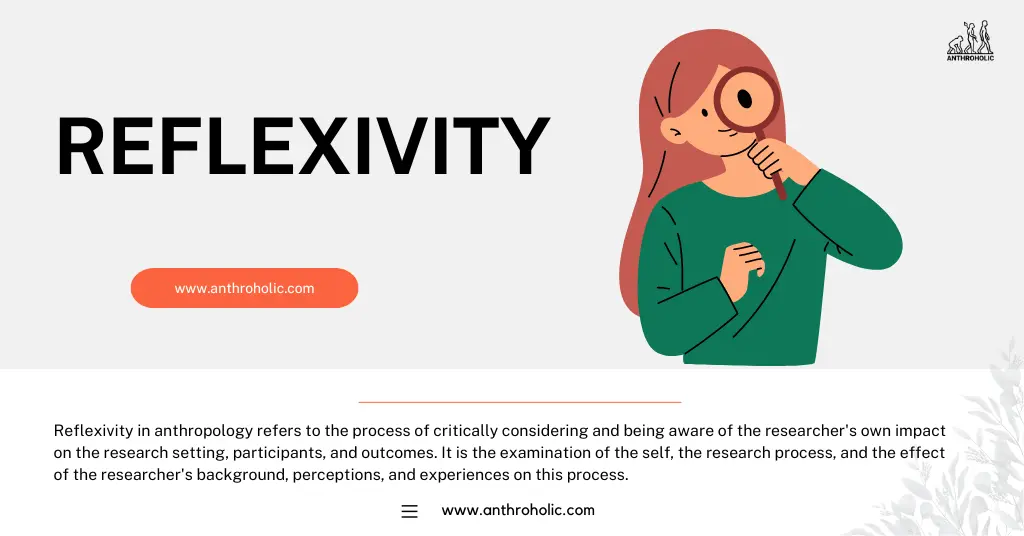AI Answer Evaluation Platform Live Now. Try Free Answer Evaluation Now
Reflexivity
Reflexivity in anthropology refers to the process of critically considering and being aware of the researcher’s own impact on the research setting, participants, and outcomes [1]. It is the examination of the self, the research process, and the effect of the researcher’s background, perceptions, and experiences on this process. As such, reflexivity is a means of acknowledging and addressing potential biases and power dynamics that arise in the course of anthropological research. This recognition of the interplay between the researcher and the research subject forms the crux of reflexivity in anthropological studies.

The Importance of Reflexivity in Anthropological Research
Reflexivity plays a crucial role in anthropological research. It helps to highlight the effect of a researcher’s own background, beliefs, and relationships on their observations and interpretations. This understanding allows for a more nuanced and ethical engagement with the research participants and can significantly enhance the depth and quality of research findings [2].
In addition, reflexivity is a crucial component of anthropological ethics. It encourages transparency and accountability in the research process, fostering trust and openness between the researcher and the participants [3]. Moreover, it helps anthropologists navigate complex cultural landscapes and power dynamics in the field, thereby making their work more accessible, relatable, and beneficial for the communities they study.
Reflexivity also enables anthropologists to challenge and rethink traditional methods and epistemologies in their discipline, paving the way for innovation and transformation in anthropological practice.
Self-Awareness in the Research Process
Self-awareness is a fundamental component of reflexivity in anthropology. It involves the researcher actively recognizing and evaluating how their own beliefs, biases, and experiences shape the research process. This includes understanding how the researcher’s identity and worldview can influence research decisions, interactions with participants, data collection, and interpretation of findings. Self-awareness allows researchers to identify and address potential sources of bias, ensuring a more ethical and balanced approach to anthropological research.
Positionality and Power Dynamics
Positionality refers to the social and political context that shapes the researcher’s perspective and relationship with the research subjects. It acknowledges that researchers are not neutral observers but active participants whose identities (e.g., gender, race, class, and nationality) affect the research process and outcomes. Understanding positionality helps anthropologists navigate the power dynamics inherent in their work, ensuring that their research does not perpetuate harmful stereotypes or power imbalances.
The Interplay between Researcher and Subject
The relationship between the researcher and the subject is a central concern in anthropological research, and reflexivity plays a crucial role in shaping this relationship.
Understanding this interplay begins with recognizing that researchers are not neutral observers; they are active participants in the research process. Their backgrounds, experiences, and biases can shape their interactions with research subjects, their interpretations of data, and their research outcomes. This is especially critical in anthropology, where researchers often engage deeply with the cultures, lives, and experiences of their subjects.
Reflexivity promotes a more ethical, respectful, and nuanced engagement with research subjects. By encouraging researchers to acknowledge and examine their biases, reflexivity can help prevent the objectification of research subjects and the imposition of the researcher’s worldviews on the subjects. This contributes to a more equitable research process where the voices and perspectives of research subjects are valued and respected.
The interplay between researcher and subject is not a one-way street. Research subjects are not passive recipients of the researcher’s gaze; they can also shape the research process and influence the researcher’s understandings and interpretations. Reflexivity, therefore, involves an ongoing dialogue and negotiation between the researcher and the subject, contributing to a more dynamic, interactive, and mutually enriching research process.
Reflexivity in Ethnographic Research
- Ethnography, by its nature, involves deep immersion in another culture or social group.
- Reflexivity in this context allows researchers to question their assumptions and perceptions continuously and to acknowledge their influence on the research process.
- This includes recognizing how their presence might affect the behavior of participants or how their interpretations might be shaped by their own cultural background [4].
- Reflexivity thus helps to enhance the reliability and validity of ethnographic research by promoting self-awareness, ethical engagement, and a more nuanced understanding of the research context.
Reflexivity and Cultural Anthropology
- In cultural anthropology, reflexivity serves as a tool for critiquing and moving beyond ethnocentric perspectives.
- It encourages researchers to recognize the cultural lens through which they view and interpret other cultures and to consider how this might affect their research findings.
- Reflexivity also aids in understanding and navigating the complex power dynamics and ethical dilemmas that often arise in cross-cultural research. By incorporating reflexivity, cultural anthropologists can strive to produce more respectful, ethical, and culturally sensitive research.
Reflexivity in Applied Anthropology
- Applied anthropology aims to solve practical problems in fields like health, education, and development.
- Reflexivity in this context can enhance the relevance and effectiveness of interventions by helping researchers understand their own biases and assumptions and how these might impact their work.
- It also promotes ethical practice by encouraging researchers to consider how their work might affect the communities they are studying and to engage these communities in a respectful and equitable manner.
- Thus, reflexivity plays a crucial role in shaping and improving the practice of applied anthropology.
Major Criticisms
One significant criticism of reflexivity is that it can lead to excessive self-focus, potentially overshadowing the research subject and diluting the original aim of the study. Critics argue that this ‘navel-gazing‘ can reduce anthropology to a form of autobiography, with the researcher’s experiences taking precedence over the lives and realities of the people they are studying.
Another critique is the issue of representation. Critics suggest that despite the claims of reflexivity to produce more honest and authentic accounts, researchers are still interpreting and representing others’ experiences through their own lenses. These interpretations could still be influenced by the researchers’ biases and power dynamics, inadvertently perpetuating stereotypes or misconceptions.
Lastly, some critics question the practicality and effectiveness of reflexivity, arguing that complete self-awareness and objectivity are unattainable ideals. They contend that while reflexivity encourages transparency, it can never fully eliminate the influence of the researcher’s background and biases.
Addressing the Criticisms: Responses from Reflexivity Advocates
In response to these critiques, advocates of reflexivity argue that it does not seek to replace traditional research methods but rather to complement and enhance them. They contend that acknowledging one’s subjectivity doesn’t mean overshadowing the research subject. Instead, it provides a context for understanding how knowledge is produced and interpreted.
Reflexivity proponents also assert that while absolute objectivity might be an unachievable goal, this doesn’t negate the value of striving for transparency and self-awareness in research. Reflexivity is seen not as a one-time event, but as a continuous process that facilitates a more ethical, nuanced, and culturally sensitive approach to anthropological research.
In terms of representation, reflexivity advocates acknowledge that all knowledge is constructed and interpretive. Therefore, the goal is not to claim an objective truth but to understand and articulate the conditions and biases that shape this construction.
The Role of Technology in Enhancing Reflexivity
Technological advancements are opening up new avenues for reflexivity in anthropological research. Digital technologies such as social media, video conferencing, and digital storytelling platforms are increasingly being used to facilitate more participatory, democratic, and reflexive research practices.
For instance, digital ethnography, which leverages online platforms and data sources, presents opportunities for researchers to engage with and understand their research subjects in new ways. These technologies can also assist in making the research process more transparent, thereby contributing to reflexivity.
Virtual reality (VR) and augmented reality (AR) technologies offer other promising avenues for enhancing reflexivity. By providing immersive experiences, these technologies can help researchers gain more nuanced understandings of the lived experiences of their research subjects.
Future Directions
As anthropology continues to evolve, reflexivity will likely remain a crucial part of this discipline’s methodological toolkit. It’s expected that reflexivity will become even more intertwined with ethical considerations, particularly as researchers grapple with the challenges and opportunities presented by digital and global research practices.
Furthermore, reflexivity will likely play an important role in addressing issues related to diversity and representation in anthropology. By encouraging researchers to acknowledge their biases and positionality, reflexivity can contribute to more inclusive, equitable, and decolonized research practices.
Ultimately, the future of reflexivity in anthropology will likely involve a continued commitment to self-critical inquiry and ethical engagement, coupled with innovative uses of technology and new methodological approaches.
References
[1] Davies, C.A. (2008). Reflexive Ethnography: A Guide to Researching Selves and Others. Routledge.
[2] Guillemin, M., & Gillam, L. (2004). Ethics, Reflexivity, and “Ethically Important Moments” in Research. Qualitative Inquiry, 10(2), 261-280. https://doi.org/10.1177/1077800403262360
[3] Ortner, S. B. (1984). Theory in Anthropology since the Sixties. Comparative Studies in Society and History, 26(1), 126-166.
[4] Clifford, J., & Marcus, G. E. (1986). Writing Culture: The Poetics and Politics of Ethnography. University of California Press.




